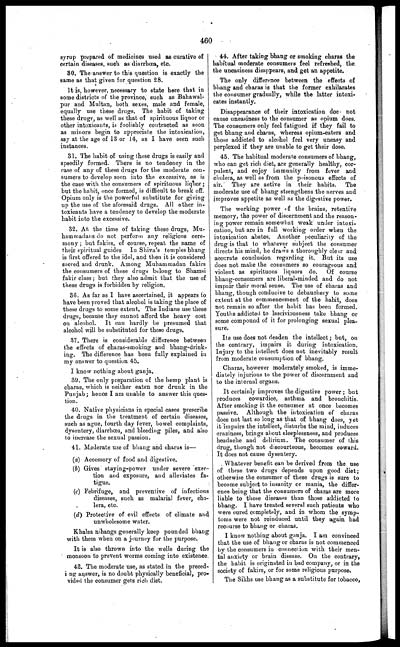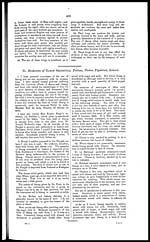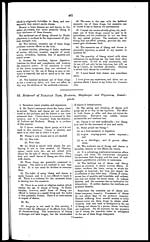Medicine - Drugs > Report of the Indian Hemp Drugs Commission, 1894-1895 > Volume V
(480) Page 460
Download files
Individual page:
Thumbnail gallery: Grid view | List view

460
syrup prepared of medicines used as curative of
certain diseases, suoh as diarrhœa, etc.
80. The answer to this question is exactly the
same as that given for question 28.
It is, however, necessary to state here that in
some districts of the province, such as Bahawal-
pur and Multan, both sexes, male and female,
equally use these drugs. The habit of taking
these drugs, as well as that of spirituous liquor or
other intoxicants, is foolishly contracted as soon
as minors begin to appreciate the intoxication,
say at the age of 13 or 14, as I have seen such
instances.
31. The habit of using these drugs is easily and
speedily formed. There is no tendency in the
case of any of these drugs for the moderate con-
sumers to develop soon into the excessive, as is
the case with the cousumers of spirituous liquor;
but the habit, once formed, is difficult to break off.
Opium only is the powerful substitute for giving
up the use of the aforesaid drugs. All other in-
toxicants have a tendency to develop the moderate
habit into the excessive.
32. At the time of taking these drugs, Mu-
hauaniadans do not perform any religious cere-
mony ; but fakirs, of course, repeat the name of
their spiritual guides In Shiva's temples bhang
is first offered to the idol, and then it is considered
sacred and drunk. Among Muhamraadan fakirs
the consumers of these drugs belong to Shamsi
fakir class; but they also admit that the use of
these drugs is forbidden by religion.
36. As far as I have ascertained, it appears to
have been proved that alcohol is taking the place of
these drugs to some extent. The Indians use these
drugs, because they cannot afford the heavy cost
on alcohol. It can hardly be presumed that
alcohol will be substituted for these drugs.
37. There is considerable difference between
the effects of charas-smoking and bhang-drink-
ing. The difference has been fully explained in
my answer to question 45.
I know nothing about ganja.
39. The only preparation of the hemp plant is
charas, which is neither eaten nor drunk in the
Punjab; hence I am unable to answer this ques-
tion.
40. Native physicians in special cases prescribe
the drugs in the treatment of certain diseases,
such as ague, fourth day fever, bowel complaints,
dysentery, diarrhoea, and bleeding piles, and also
to increase the sexual passion.
41. Moderate use of bhang and charas is—
(a) Accessory of food and digestive.
(b) Gives staying-power under severe exer-
tion and exposure, and alleviates fa-
tigue.
(c) Febrifuge, and preventive of infectious
diseases, such as malarial fever, cho-
lera, etc.
(d) Protective of evil effects of climate and
unwholesome water.
Khalsa nihangs generally keep pounded bhaug
with them when on a journey for the purpose.
It is also thrown into the wells during the
monsoon to prevent worms coming into existence.
42. The moderate use, as stated in the preced-
ing answer, is no doubt physically beneficial, pro-
vided the consumer gets rich diet.
44. After taking bhang or smoking charas the
habitual moderate consumers feel refreshed, the
the uneasiness disappears, and get an appetite.
The only difference between the effects of
bhang and charas is that the former exhilarates
the consumer gradually, while the latter intoxi-
cates instantly.
Disappearance of their intoxication doe not
cause uneasiness to the consumer as opium does.
The consumers only feel fatigued if they fail to
get bhang and charas, whereas opium-eaters and
those addicted to alcohol feel very uneasy and
perplexed if they are unable to get their dose.
45. The habitual moderate consumers of bhang,
who can get rich diet, are generally healthy, cor-
pulent, and enjoy immunity from fever and
cholera, as well as from the poisonous effects of
air. They are active in their habits. The
moderate use of bhang strengthens the nerves and
improves appetite as well as the digestive power.
The working power of the brains, retentive
memory, the power of discernment and the reason-
ing power remain somewhat weak under intoxi-
cation, but are in full working order when the
intoxication abates. Another peculiarity of the
drug is that to whatever subject the consumer
directs his mind, he draws a thoroughly clear and
accurate conclusion regarding it. But its use
does not make the consumers so courageous and
violent as spirituous liquors do. Of course
bhang-consumers are liberal-minded and do not
impair their moral sense. The use of charas and
bhang, though conducive to debauchery to some
extent at the commencement of the habit, does
not remain so after the habit has been formed.
Youths addicted to lasciviousness take bhang or
some compound of it for prolonging sexual plea-
sure.
Its use does not deaden the intellect; but, on
the contrary, impairs it during intoxication.
Injury to the intellect does not inevitably result
from moderate consumption of bhang.
Charas, however moderately smoked, is imme-
diately injurious to the power of discernment and
to the internal organs.
It certainly improves the digestive power ; but
produces cowardice, asthma and bronchitis.
After smoking it the consumer at once becomes
passive. Although the intoxication of charas
does not last so long as that of bhang does, yet
it impairs the intellect, disturbs the mind, induces
craziness, brings about sleeplessness, and produces
headache and delirium. The consumer of this
drug, though not discourteous, becomes coward.
It does not cause dysentery.
Whatever benefit can be derived from the use
of these two drugs depends upon good diet;
otherwise the consumer of these drugs is sure to
become subject to insanity or mania, the differ-
ence being that the cousumers of charas are more
liable to those diseases than those addicted to
bhang. I have treated several such patients who
were cured completely, and in whom the symp-
toms were not reinduced until they again had
recourse to bhang or charas.
1 know nothing about ganja. I am convinced
that the use of bhang or charas is not commenced
by the consumers in connection with their men-
tal anxiety or brain disease. On the contrary,
the habit is originated in bad company, or in the
society of fakirs, or for some religious purpose.
The Sikhs use bhang as a substitute for tobacco,
Set display mode to: Large image | Zoom image | Transcription
Images and transcriptions on this page, including medium image downloads, may be used under the Creative Commons Attribution 4.0 International Licence unless otherwise stated. ![]()
| India Papers > Medicine - Drugs > Report of the Indian Hemp Drugs Commission, 1894-1895 > Volume V > (480) Page 460 |
|---|
| Permanent URL | https://digital.nls.uk/75122288 |
|---|
| Description | Volume 5: Evidence of witnesses from North-Western Provinces and Oudh and Punjab. Answers from witnesses in North-Western Provinces, Oudh and Punjab about cultivation and growth of hemp, preparation or manufacture, trade, consumption or use, effects, administration - taxation and control. |
|---|---|
| Attribution and copyright: |
|




